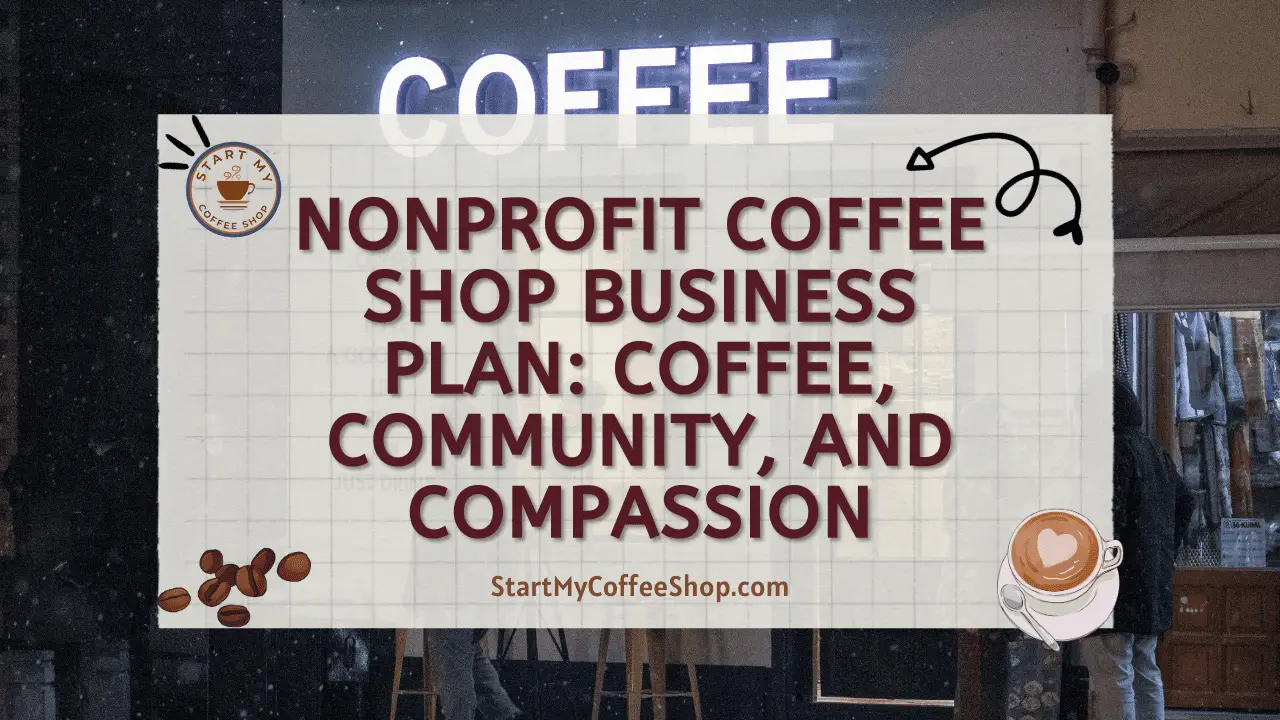In recent years, the concept of blending business with social impact has gained significant traction. Nonprofit coffee shops have emerged as powerful vehicles for creating positive change within communities. These establishments not only serve as gathering places for coffee enthusiasts but also channel their profits toward supporting worthy causes.
A nonprofit coffee shop business plan has an executive summary, mission and vision, market analysis, marketing, branding, revenue streams, financial projections, operational plan, community and impact measurement, and risk and mitigation strategies. Serve the community, support causes, and create positive change.
In this article, I will delve into the essential components of a nonprofit coffee shop business plan, exploring the unique opportunities and challenges these ventures present.
Executive Summary
The executive summary plays a crucial role as the gateway to your nonprofit coffee shop business plan. Within this concise section, you have the opportunity to captivate potential stakeholders and donors with a compelling narrative that highlights the essence of your venture. In a few succinct paragraphs, you should provide an overview of your mission, clearly articulating the social or environmental cause you aim to address.
It is essential to outline your target market, identifying the demographics and preferences of your prospective customers. Lastly, include a glimpse into your financial projections, demonstrating the potential for sustainability and growth. By crafting an executive summary that combines passion, purpose, and a sound business strategy, you will effectively engage readers and entice support for your cause-driven coffee shop.
Read more about: How to Start a Coffee Shop Business Plan: Factors That You Need to Consider
Mission and Vision
Clearly defining the mission and vision of your nonprofit coffee shop is a critical step in establishing a strong foundation for your venture. Your mission statement should reflect the social or environmental issue you aim to address through your coffee shop.
Are you passionate about supporting local farmers by sourcing ethically produced beans? Do you seek to empower disadvantaged communities by providing training and employment opportunities? Are you committed to funding education initiatives through the profits generated by your coffee sales?
By articulating a powerful mission statement, you not only convey the purpose and values of your nonprofit coffee shop to your customers but also attract potential partners who share your vision. A well-crafted mission statement serves as a guiding compass, inspiring and aligning the efforts of your team toward a common goal.
It creates a sense of purpose and resonance that extends beyond the mere act of brewing and serving coffee. Ultimately, a strong mission statement establishes the groundwork for your coffee shop to make a meaningful impact in the community you serve.
Market Analysis

Conducting comprehensive market research is a vital step in developing a great nonprofit coffee shop. By delving into your target audience and the competitive landscape, you gain valuable insights that inform your business strategy. Identify the demographics, preferences, and coffee consumption habits of your potential customers to tailor your offerings and create a personalized experience.
Analyze local competition, studying their strengths and weaknesses, to identify areas where your nonprofit coffee shop can stand out and provide a unique value proposition. Look for gaps in the market that align with your mission and vision, allowing you to carve out a niche and differentiate yourself.
Armed with this knowledge, you can refine your marketing efforts, design a captivating ambiance, and curate a menu that resonates with your target market. Market research empowers you to make informed decisions and positions your nonprofit coffee shop for improvement in a competitive industry.
Marketing and Branding
Crafting a compelling brand identity is a pivotal aspect of establishing an effective nonprofit coffee shop. Your brand should go beyond just a name and logo; it should embody the values and mission of your coffee shop. Develop a unique brand story that narrates the journey of your nonprofit, highlighting the social or environmental cause you support and the impact you aim to make.
To resonate with your target market, it is crucial to understand their aspirations and preferences. Tailor your brand identity to align with your values and desires. Whether it’s sustainability, community engagement, or fair trade, infuse these elements into your brand story and messaging.
Utilize social media platforms to amplify your brand message and engage with your audience. Share your mission, showcase your impact, and encourage community involvement through interactive content. Host community events that align with your values, such as fundraisers, workshops, or sustainability initiatives, to further establish your presence and forge meaningful connections.
Forge partnerships with like-minded organizations, such as local nonprofits or sustainable suppliers. Collaborate on events, co-create content, or cross-promote each other’s initiatives to reach a broader audience and strengthen your brand’s impact.
Read more about: How to Start a Coffee Business: From a Coffee Lover to a Business Owner
Revenue Streams
As a nonprofit coffee shop, your revenue streams will extend beyond the conventional avenues of coffee sales. While coffee remains a significant source of income, it’s essential to explore additional opportunities to generate revenue and support your cause. Consider diversifying your income sources by offering merchandise featuring your brands, such as mugs, t-shirts, or coffee accessories. These products not only provide an additional revenue stream but also serve as promotional items that spread awareness of your mission.
Event hosting can also be a fruitful endeavor. Consider organizing special events, such as live music performances, open mic nights, or themed gatherings, which not only attract customers but also create memorable experiences. Collaborating with local artisans or hosting pop-up shops can further enhance your revenue streams while promoting local talent and craftsmanship.
Implementing a membership program or offering coffee subscriptions can provide a reliable source of recurring revenue. Memberships can include benefits like exclusive discounts, early access to new products, or members-only events. Coffee subscriptions, on the other hand, offer customers the convenience of regular deliveries while fostering a sense of community and support for your cause.
Financial Projections
Developing realistic financial projections is a critical step in ensuring the long-term sustainability of your nonprofit coffee shop. Start by outlining your startup costs, which may include equipment purchases or leases, renovations or leasehold improvements, permits and licenses, and initial inventory. Factor in any costs associated with branding, marketing, and hiring professionals for legal or accounting services.
Next, estimate your monthly expenses, which encompass a range of items such as staff wages, rent or mortgage payments, utilities, inventory replenishment, marketing and advertising expenses, and general overhead costs. Be thorough in identifying and accounting for all potential expenses to have a comprehensive understanding of your financial obligations.
To project revenue, consider conducting market research to estimate your potential customer base and calculate expected sales. Analyze industry trends, local demographics, and competitor performance to make informed assumptions. It is wise to prepare multiple scenarios, such as conservative, moderate, and optimistic projections, to gauge the financial feasibility of your venture under various circumstances.
Regularly monitor and review your financial projections against actual performance, making adjustments as needed. This will allow you to identify potential areas of improvement and make informed decisions to maintain financial stability and growth.
Operational Plan
In your operational plan, it is important to address the practical aspects of running your nonprofit coffee shop on a day-to-day basis. Begin by defining your location, considering factors such as visibility, foot traffic, and accessibility. Determine the layout and interior design of your space, ensuring it aligns with your brand and provides a welcoming atmosphere for customers.
Next, outline your staffing needs and clearly define the roles and responsibilities of each team member. Consider the necessary positions, such as baristas, cashiers, kitchen staff, and managers, and identify the skills and qualifications required for each role. Detail the training and development programs you will implement to ensure your staff is well-equipped to deliver exceptional service.
Develop efficient processes for sourcing coffee beans, ensuring quality and sustainability. Establish relationships with local or fair trade suppliers and create a system for inventory management to maintain optimal stock levels while minimizing waste.
Prioritize customer service by creating a customer-centric approach. Implement protocols for order taking, beverage preparation, and handling customer inquiries or complaints. Focus on providing a personalized and memorable experience that keeps customers coming back.
Read more about: How to Start a Business Plan for a Coffee Shop: The Art of Brewing Business
Community Engagement

Foster meaningful connections by actively seeking partnerships with other nonprofits that share similar values or causes. Collaborate on initiatives, joint events, or fundraising campaigns to amplify your collective impact and reach a broader audience.
Host fundraising events at your coffee shop to support local charities or community projects. These events not only raise awareness and funds but also create a sense of camaraderie and involvement within the community.
Consider providing space within your coffee shop for local artists and musicians to showcase their talents. This not only supports the local arts scene but also adds an element of creativity and vibrancy to your establishment, attracting diverse customers.
Demonstrate your commitment to the environment by implementing sustainable practices. Consider options like composting coffee grounds, using biodegradable packaging, or reducing single-use plastics. Communicate these initiatives to your customers, educating them on the positive environmental impact of their coffee choices.
Impact Measurement
One of the distinguishing characteristics of nonprofit coffee shops is their commitment to measuring and communicating their impact. Set clear metrics to track your progress in addressing the social or environmental issue at the core of your mission.
Regularly report on your achievements, sharing updates with stakeholders. By transparently showcasing the positive change you’re making, you keep stakeholders informed and inspired to continue supporting your cause.
This accountability and transparency not only build trust but also demonstrate your dedication to creating a meaningful and lasting impact in your community and beyond.
Risks and Mitigation Strategies
It is crucial to proactively identify potential risks and challenges that could affect the growth of your nonprofit coffee shop. Consider factors such as evolving consumer preferences, increasing costs of supplies or operations, or limited availability of funding opportunities.
By recognizing these risks, you can develop mitigation strategies to minimize their impact. This may involve diversifying your menu or offerings to cater to changing tastes, implementing cost-saving measures, or exploring alternative fundraising avenues.
By having contingency plans in place, you can adapt and navigate obstacles as they arise, ensuring the continued growth and sustainability of your nonprofit coffee shop. Being prepared and proactive allows you to mitigate risks effectively and maintain a resilient business model.
Summary
Building an effective nonprofit coffee shop requires a well-crafted business plan that aligns your social mission with effective strategies for sustainability and community engagement. By combining your passion for coffee with a commitment to making a difference, your nonprofit coffee shop has the potential to become a catalyst for positive change.
Remember, running a nonprofit coffee shop is a journey filled with challenges and rewards. Embrace the opportunity to connect with people, share stories, and make a difference one cup at a time. Cheers to your nonprofit coffee shop venture and the positive impact it will have on the world!
Frequently Asked Questions
Q: What makes a nonprofit coffee shop different from a regular coffee shop?
A: Nonprofit coffee shops have a dual purpose of serving quality coffee and supporting social or environmental causes. They channel their profits towards initiatives that create positive change in their communities.
Q: How can I determine the social or environmental cause my nonprofit coffee shop will support?
A: Start by identifying issues that align with your values and resonate with your target audience. Consider local needs, such as supporting disadvantaged communities, promoting sustainable practices, or empowering marginalized groups.
Q: Can a nonprofit coffee shop generate enough revenue to sustain its operations and support its cause?
A: Yes, a well-planned nonprofit coffee shop can generate revenue through coffee sales, merchandise, events, partnerships, and other creative income streams. Effective financial planning and community engagement are key to sustainability.
To learn more on how to start your own coffee shop, check out my startup documents here.
Disclaimer: The information provided by StartMyCoffeeShop.com (“The Site”) is for general informational purposes only. All information on the Site is provided in good faith. However, we make no representation or warranty of any kind, express or implied, regarding the accuracy, adequacy, validity, reliability, availability, or completeness of any information on the Site. Under no circumstance shall we have any liability to you for any loss or damage of any kind incurred as a result of the use of the Site or Reliance on any information provided on the Site. Your use of the Site and reliance on any information on the Site is solely at your own risk. This blog post is for educational purposes only and does not constitute legal advice. Please consult a legal expert to address your specific needs. Terms and Conditions. (https://startmycoffeeshop.com/terms-and-conditions/)

Hi! I’m Shawn Chun
My adventure in coffee began when I first launched my first coffee shop back in the early 2000s. I had to figure out so many things on my own and to make it worse within 2 years of opening two large corporate coffee chains moved in just blocks away from me!
As I saw smaller and even some larger coffee shops in the neighborhood slowly lose customers to these giant coffee chains and slowly close up shop, I knew that I had to start getting creative…or go out of business.
I (like you may be) knew the coffee industry well. I could make the best latte art around and the foam on my caps was the fluffiest you have ever seen. I even had the best state-of-the-art 2 group digital Nuova Simonelli machine money could buy. But I knew that these things alone would not be enough to lure customers away from the name brand established coffee shops.
Eventually, through lots of trial and error as well as perseverance and creativity I did find a way to not only survive but also thrive in the coffee/espresso industry even while those corporate coffee chains stayed put. During those years I learned to adapt and always faced new challenges. It was not always easy, however, in the end, I was the sole survivor independent coffee shop within a 10-mile radius of my location. Just two corporate coffee chains and I were left after that year. All told the corporate coffee chains took down over 15 small independent coffee shops and kiosks and I was the last one standing and thriving.
Along the years I meet others with the same passion for coffee and I quickly learned that it is not only “how good a barista is” that makes a coffee shop successful, but the business side of coffee as well.
Hence why I started this website you are on now. To provide the tools and resources for up and coming coffee shop owners to gain that vital insight and knowledge on how to start a coffee shop successfully.
Stick around, browse through my helpful blog and resources and enjoy your stay! With lots of LATTE LOVE!
Shawn






